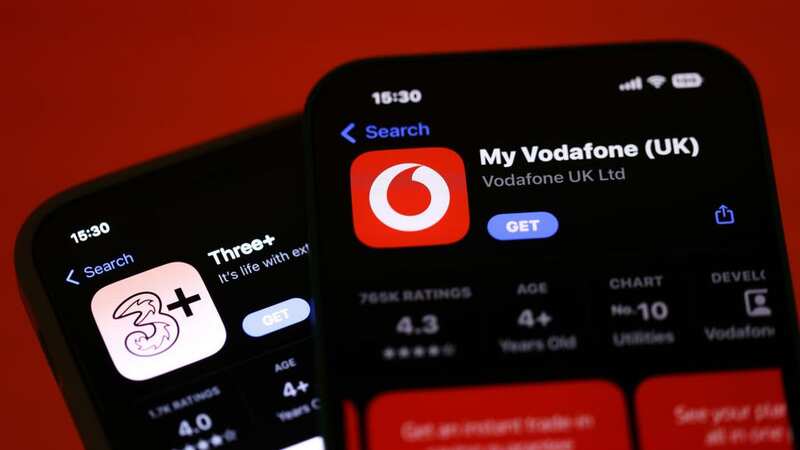
Vodafone has confirmed plans to merge with fellow mobile provider Three in a major deal which will create the biggest mobile operator in the UK.
The tie-up would bring together around 27 million customers, surpassing EE which is owned by BT Group, and Virgin Media O2, owned by Telefonica and Liberty Global.
Virgin Media O2 has around 24 million customers while EE, which is owned by BT Group, has 20 million mobile users.
The move - if approved - would also cut the number of major operators in the UK from four to three.
The pair previously announced that 51% of the new company will be owned by Vodafone and 49% by CK Hutchison, the Hong Kong conglomerate that owns Three.
 Martin Lewis issues 8-week warning to phone users ahead of huge price hikes
Martin Lewis issues 8-week warning to phone users ahead of huge price hikes
However, the deal is not set in stone as the Competition and Markets Authority’ (CMA) will have to agree on the proposals - and this decision could take several months.
The regulators have previously blocked a takeover of O2 by Three in 2016.
This deal, worth £10.25billion, was given a red light as it believed the detail would reduce "competition" for customers by turning Three from a challenger into the biggest operator.
The CMA argued this would result in less "innovation and investment".
As the merger has not yet been approved by the regulator, there will be no immediate impact on Vodafone or Three customers.
In the release, Vodafone and Three acknowledged this possible concern from the CMA saying that the merger will create a "third operator with scale" that would "level the competitive playing field" and "increase competition to the UK’s two leading converged operators".
The groups also claim that the merger would "provide more choice in wholesale partners for the UK’s already competitive MVNOs".
Margherita Della Valle, Vodafone Group chief executive, described the merger of Vodafone UK and Three UK as being “great for customers, great for the country and great for competition.”
Alongside the announcement, the groups said they would invest £11billion over 10 years to create, what they described as, "one of Europe's most advanced standalone 5G networks".
The group says that every school and hospital in the UK will have access to standalone 5G by 2030.
 Parents believe their kids know more than them about technology by 12 years old
Parents believe their kids know more than them about technology by 12 years old
Ahmed Essam, Vodafone UK chief executive, said: “The combination of Vodafone UK and Three UK will bring more choice and better value to customers nationwide.
"With scale to invest, we will create a best-in-class 5G network, supporting the Government’s 5G ambitions, drive digital transformation and create jobs.
"Through converged offers, we will really challenge the two largest operators and, of course, we will continue to support the most vulnerable in society with our social tariffs and our commitment to help six million people cross the digital divide by 2025.”
Ernest Doku, telecoms expert at Uswitch.com said there were always "potential pros and cons" for any merger like this but with the number of Mobile Network Operators (MNOs) dropping from four to three there is a risk of reduced competition and subsequently increased prices.
Ernest added: “At a time when millions across the UK are facing the highest mid-contract prices we’ve ever seen, consumers need assurances that this merger will not result in even higher household bills.
"The pledge of a significant investment in 5G over the next decade is some solace that they will be building for a better future of connectivity, so long as it is adhered to. What we don’t want to see is customers footing the bill with further increases to pricing.
“They should also commit to ensuring smaller virtual networks (MVNOs) who rely on Three and Vodafone’s infrastructure can continue to offer competitive value and service.
“Also, while the cost-saving benefits for Vodafone and Hutchinson are clear, the merged company needs to ensure it delivers an upside for consumers – specifically, its promise of innovation and an advanced standalone 5G network.”